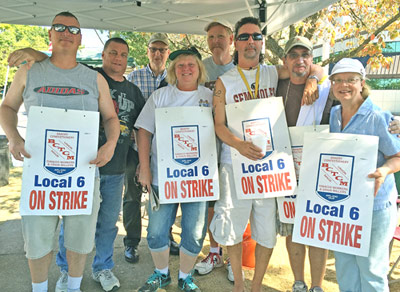
Vol. 80/No. 39 October 17, 2016
—ON THE PICKET LINE—
Maggie Trowe, Editor

Help the Militant cover labor struggles around the world!
This column gives a voice to those engaged in battle and building solidarity today — including workers locked out by Honeywell, United Gas Workers Union members fighting concession demands by Dominion Gas and construction workers demanding safe conditions. I invite those involved in workers’ battles to contact me at 306 W. 37th St., 13th Floor, New York, NY 10018; or (212) 244-4899; or themilitant@mac.com. We’ll work together to ensure your story is told.
— Maggie Trowe
Candy workers strike Just Born ‘Peeps’ plant in Pennsylvania
BETHLEHEM, Pa. — Workers here who produce the marshmallow chicks known as “Peeps” went on strike against the Just Born candy company Sept. 7. The 400 members of Bakery, Confectionery, Tobacco Workers and Grain Millers Local 6, whose contract expired in June, rejected what a union statement called a “substandard” wage increase and the bosses’ proposal to eliminate the pension plan for new hires and increase health insurance costs.
A week after the walkout, applicants at a company-organized “job fair” at the plant were met by striking workers. One of them, Debbie Harden, who has worked as a machine operator and package handler for 16 years, told the Militant that the company wants to hire temporary and part-time workers at lower pay and with no benefits for “special projects.”
“But who knows which job the company could say is a special project? It could be mine,” she said.
Union steward Alex Fattore said that while some 65 union members have crossed the picket lines, contingents of former Verizon strikers who are members of the Communications Workers of America, workers from the International Brotherhood of Electrical Workers, as well as Teamsters, have made solidarity visits.
Union officials, citing progress in negotiations, announced Sept. 30 that strikers would return to work that day.
— George Chalmers and Janet Post
California farmworkers discuss fight for overtime pay
FRESNO, Calif. — For years, farmworkers from up and down the Central Valley have fought to extend overtime pay for over eight hours a day and 40 hours a week. In August hundreds of United Farm Workers union members rallied at the state Capitol in Sacramento demanding legislators pass a bill to guarantee time-and-a-half overtime pay.
A new law signed by liberal Democratic Gov. Jerry Brown Sept. 12 sets a slow-motion course toward meeting the workers’ demands. And it lets him suspend the progression by a year if he says it’s necessary.
Starting in January 2019, the number of hours farmworkers must work before receiving overtime pay will drop by 30 minutes per year, reaching eight hours in 2022. For workers on farms with 25 or fewer employees, it will take another three years.
“We’ve been fighting for this for 78 years,” Augustín García, a fruit-tree worker and UFW member, told the Militant in his home Sept. 18. He is a veteran of the fight for a union contract at Gerawan Farms.
In 1938, under the pressure of big labor battles that built the CIO industrial unions, Congress was forced to pass the Fair Labor Standards Act, which set a minimum wage and overtime pay. But agricultural workers were exempted.
In California, UFW-led farmworkers’ mobilizations won overtime pay in the 1970s. But it didn’t start until after a 10-hour day or 60-hour week.
“Being treated like other workers, it means respect for us and respect for what we do,” said García.
But agricultural bosses in California claim they can’t pay the overtime rates under the new law. They argue increased competition from imports and a yearslong drought mean they’ll go out of business or cut overtime to save money, and the workers will suffer.
García had just returned from working the last day of a seven-day workweek. Many farmworkers work 10-hour days, six or seven days a week.
“I’m hoping the overtime pay will mean that many of us won’t be working Sundays and get to come home earlier on Saturday,” he said.
Rafael Marquez, another union farmworker, said many of his co-workers were upset at the number of years it will take to get overtime after eight hours.
“The growers have been getting rich off our work, robbing us all these years,” he said. “They owe us!”
— Betsey Stone
Related articles:
NJ train crash shows need for bigger crews, workers control
Front page (for this issue) | Home | Text-version home